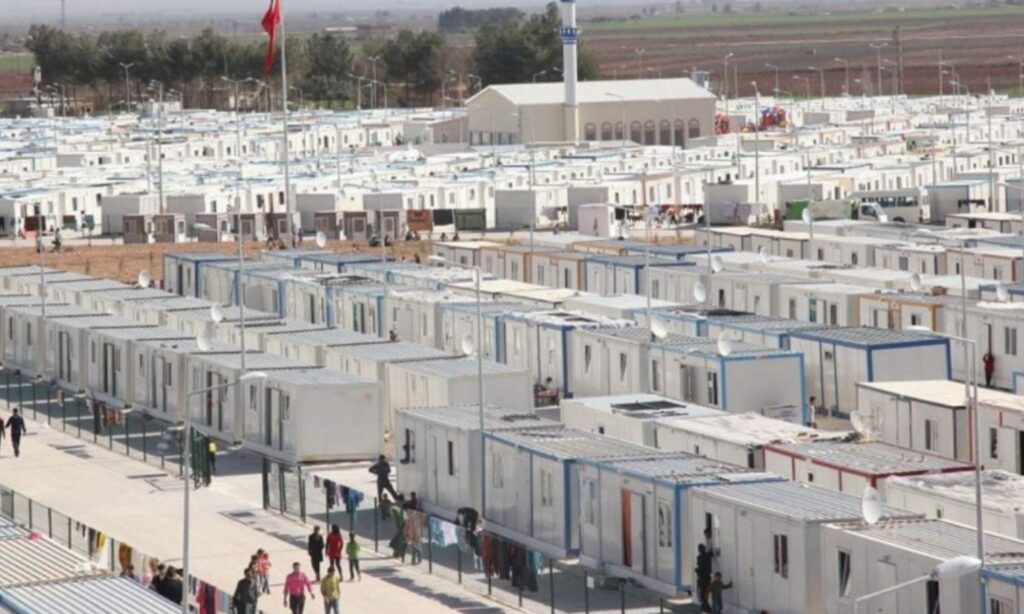About a month ago, the Abaydin (Officers’) camp management in Hatay, southern Turkey, presented two options to the families living in the camp to vacate it.
The camp houses families of Syrian refugees affected by the earthquake that hit southern Turkey and four Syrian provinces on February 6, 2023.
According to official statistics, more than 3000 Syrian refugees under “temporary protection” are still residing in the Abaydin camp.
During the year 2023, the Turkish authorities closed two camps in both Gaziantep and Kilis cities, which were hosting about 9000 Syrian refugees, and their camp residency restrictions were removed after the closures.
Unavailable compensation
The method of closing Elbeyli camp in Kilis and Nizip camp in Gaziantep was similar to the options at the Abaydin camp, and the compensation amounts offered to the Syrian refugees in the same camp are identical: a refugee wanting to move to Turkish provinces excluding Istanbul is granted 6,500 Turkish liras, while the amount offered for those wishing for voluntary return to Syria is 14,000 Turkish liras.
Based on testimonies obtained by Enab Baladi from three individuals from different families in the Abaydin camp, the same amounts were offered to the residents, but the difference was the cities to which families were prevented from relocating, as the refugees were not allowed to move from the camp to either Hatay or Istanbul.
Later, the financial compensation became unavailable to camp residents, as its management determined two options for them: either move to Turkish provinces except the excluded ones or head to the Cevdetiye camp in Osmaniye, southern Turkey, amid plans to convert the camp into a prison.
“Coercion”
Three individuals (who refrained from mentioning their full names due to legal concerns) were contacted by Enab Baladi to obtain information on how the closure decision was announced and what options were available to the Syrian refugees living in the camp.
The refugees expressed to Enab Baladi that the closure decision created a state of anxiety and confusion while they attempted to find suitable solutions after losing their housing and possessions following the earthquake.
Rasha, one of the affected individuals, explained to Enab Baladi that the decision was surprising for the family, and after it was issued by the administration, the family chose to stay in the camp until the deadline on January 18.
Rasha’s family moved to the Abaydin camp after the earthquake, as they were residing in Antakya within the province that hosts the camp, according to her.
Rasha’s husband decided to stay in Hatay in case the camp closed due to the presence of a surrounding community of Turks who speak Arabic “clearly,” which helps him to adapt as he does not know Turkish, despite the camp director’s confirmation that the camp residents’ registrations would be removed from the Turkish Immigration Directorate in Hatay if they decided to rent a house and stay in Hatay.
Those leaving the Abaydin camp cannot rent houses in Hatay without obtaining a clearance paper from the camp director, who refuses to give it to a refugee to transfer his family’s registration, as Khadija told Enab Baladi.
Khadija, a Syrian refugee, lives with her six-member family in the camp and does not wish to leave until they are forced to vacate it. She mentioned that until January 10, no one had moved to the Cevdetiye camp in Osmaniye after registering with the management of the camp scheduled for closure.
According to official statistics issued by the Turkish Presidency of Migration Management, 8,634 individuals reside in the Cevdetiye camp in Osmaniye, while the number of Syrian refugees under the “temporary protection” system in Turkey is 3,199,927 individuals, and in Hatay province, there are 279,758 Syrian refugees.
No solutions
Syrian refugees in the camp are left with few alternative solutions due to the difficulty of poor living conditions, economic hardships, and low labor wages compared to commodity prices, amid clear pressure from the camp administration, as Ali told Enab Baladi.
In a meeting conducted by the camp management with the families on January 8, the director confirmed that the “temporary protection cards” (kimlik) would ultimately be transferred to Osmaniye city.
Ali, who is from Idlib city in northern Syria, said that the families in the camp collectively oppose the decision but to no avail or change, and he explained that he is determined to stay in the camp until the last moment.
Ali’s family consists of four members, who were residing in the Narlıca area in Hatay city, and the young man does not wish to transfer the “kimlik” to Osmaniye city.
Consecutive closures
Before being affected by the earthquake in 2023, the Abaydin (Officers’) camp was home to families of Syrian officers who fled to Turkey after the Syrian revolution broke out in March 2011, and the Turkish government moved them to Bohşin camp, about nine kilometers away from the Officers’ camp.
The decision to close the camps for Syrian refugees in Turkey comes as a continuation of previous decisions in 2018 regarding camp closures, which is a routine matter by the Turkish Immigration Presidency and has been followed for years.
The Turkish Presidency of Migration Management has closed nearly 19 out of 25 camps, with previous plans to keep a number of them specifically for the disabled, according to a previous statement by Jalal Demir, president of the Arab Media House in Turkey, to Enab Baladi.
Demir continued that the remaining camps were not closed in the past periods due to the earthquake that struck northern Syria and southern Turkey on February 6, 2023, in addition to the presidential elections, economic reasons, and administrative changes, which led to the Migration Management not accelerating the closure decision.
There are seven camps hosting Syrian refugees under “temporary protection” in five Turkish provinces: Hatay, Kahramanmaraş, Osmaniye, Malatya, and Adana. These camps are home to more than 62,000 refugees, according to official statistics issued by the Turkish Presidency of Migration Management.

